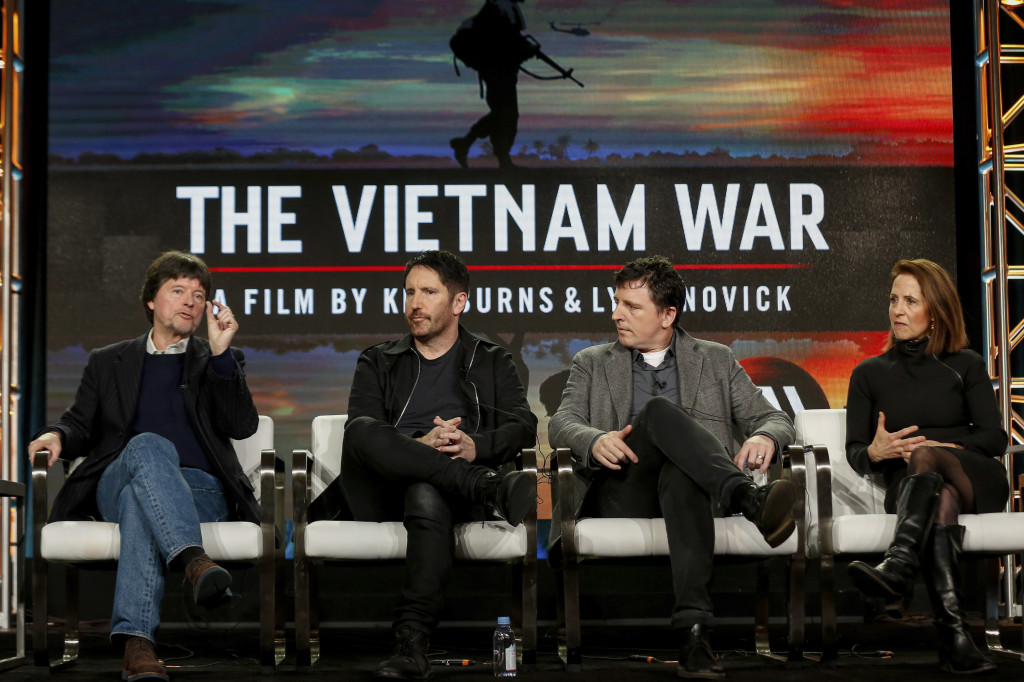 It seemed an odd contrast: The sexagenarian Beatle bob of Ken Burns vs. the darker, calculated spikes of the rock star.
It seemed an odd contrast: The sexagenarian Beatle bob of Ken Burns vs. the darker, calculated spikes of the rock star.
But where the documentarian is pegged with using (or overusing) old timey fiddle music on his epics like “The Civil War” or “National Parks,” Trent Reznor is slashing and burning in Nine Inch Nails.
It’s Reznor’s instrumental soundtrack work with collaborator and now Nine Inch Nails member Atticus Ross on “The Social Network,” “The Girl with the Dragon Tattoo” and “Gone Girl” that got the ear of Burns and his collaborator Lynn Novick that they would also be perfect to score their upcoming 18-hour public television documentary on Vietnam.
“The soundtrack they delivered us permitted us to have both the discomfiting anxiety of feeling what this world was about but, underneath it, a kind of melodic and emotional core,” Burns told critics at the TV Critics Association winter press tour in Pasadena last week. “I’m an emotional archaeologist, and they were able to deliver both the reality of the Vietnam War to us, but also the underlying sense of possibility and hope.”
I asked Reznor what his touchstones were for the project, and whether it included things like Jimi Hendrix- Band of Gypsys “Machine Gun.”
“We were very flattered to get the phone call from Ken and Lynn,” he said. “And after immediately saying, ‘Yes, we’d love to work on this,’ my first instinct was what is it that we have to offer, particularly for this important length of time in American history? And, you know, seeing some footage that they’d shot, speaking with Ken and Lynn, they were looking for this emotional context and fabric.”
“We knew there would be licensed material from the era,” he said. “We didn’t focus on that. We got a laundry list of emotional feelings, content that they were looking for. And their style of working complements the ways ours does, which is we were able to kind of disappear over, for us, a lengthy period of time and generate music from a very impressionistic place that was really from the gut, trying to immerse ourselves in these different sentiments that they were looking for and create long pieces of music that then we would entrust with them and their editing team to place in and weave in amongst music from the era and some other material that Yo Yo Ma and Silk Road had recorded.”
For a guy who is used to turning out music much more quickly, Reznor says, “it was really a kind of lengthy exercise for us in just trying to convey that emotional feeling that we can through the instrumentation that we do we weren’t trying to emulate sounds of that era and put trust in them as filmmakers that they could make that make sense and trust that they reached out to us for a reason and kind of go with what we felt innately was the right thing to do.”
“Music is so central to us,” Burns says. “For most films, soundtracks are added at the end. They are the sort of icing, the cherry on the cake, on the thing. And we actually had this material from the beginning of editing so that we would change our writing, we would change our scene to the music. And rather than music being an afterthought that you hope inflates emotions that are there, it’s baked into our interest and our storytelling.”
For Novick, it was a gift to get so much music from the duo so quickly.
“Your process of how you created this extraordinary music is a bit of a mystery to us,” she said. “One day we get a message, ‘Go to your Dropbox,’ and we opened it up, and there was just this extraordinary array of magnificent music that could not have expressed what we wanted to say in the film better. It’s just not possible to say. But one thing that we absolutely noticed was just the craft and the subtlety with which you intertwined sound and music that just sort of worked perfectly with what we were trying to do in the film. And I had no idea how much time went into it, not a clue. But we’re very grateful that you were able to spend all that time. It shows in the nuances and subtleties of the music really almost can’t be described.”
“Vietnam” comes to PBS in September.